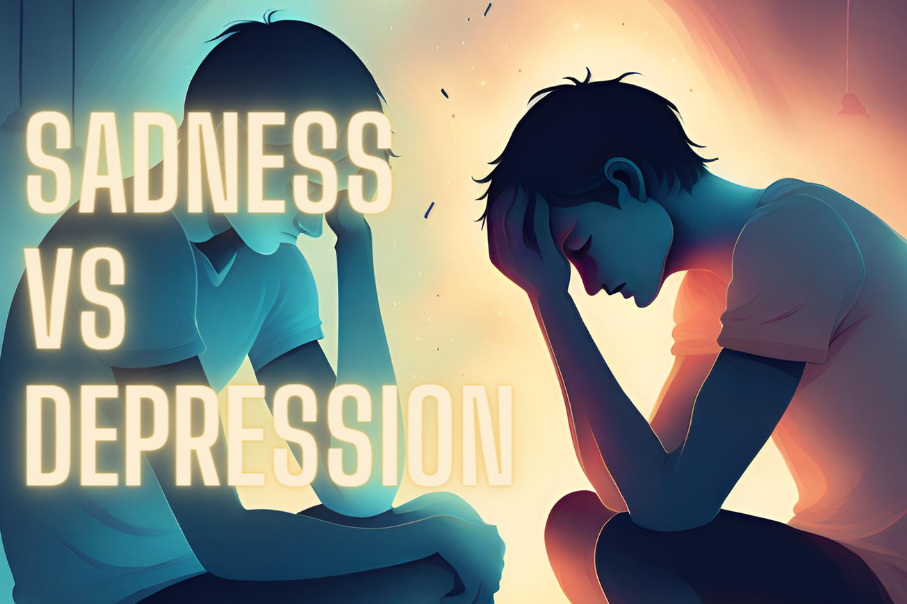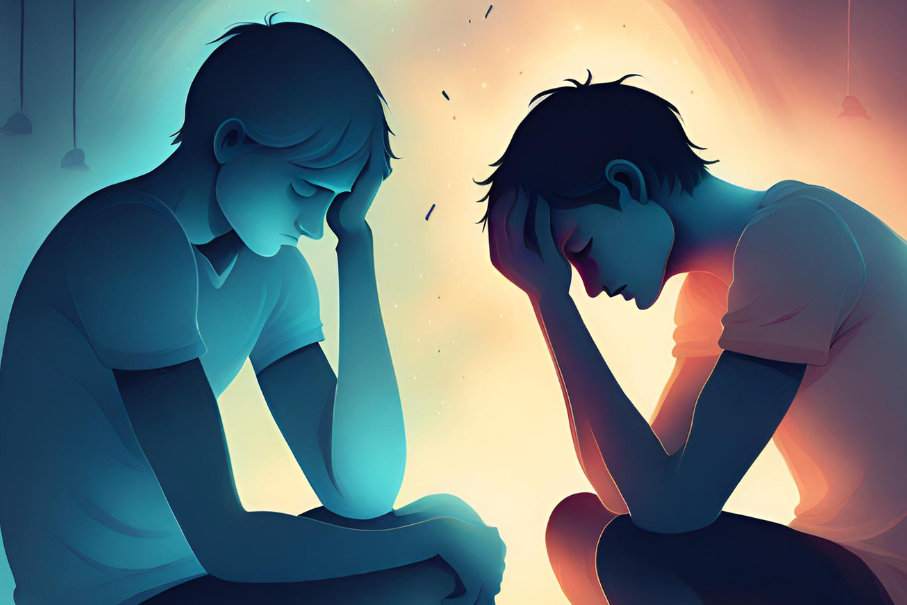
You’ve felt down before, but how do you know if it’s just sadness or something more? It’s crucial to distinguish between a temporary mood and clinical depression.
In this article, you’ll discover six clear ways to tell them apart. From the duration and intensity of your feelings to their effects on your daily life, you’ll learn what sets them apart and when it’s time to seek help.
Dive in and take charge of your emotional well-being.
Understanding Duration Differences
One of the most distinguishable factors between sadness and depression is the length of time you’re affected by these feelings. Sadness is a natural, temporary emotion in response to an event, like losing a game or watching a tear-jerking movie. You’ll likely bounce back in a few hours or days.
Depression, on the other hand, isn’t just an occasional feeling of blue. It’s a persistent state that lingers for at least two weeks, often much longer. You’re grappling with depression if the heaviness doesn’t lift, and your mood starts to interfere with your daily life. Activities you once enjoyed don’t interest you anymore, and getting through the day feels like wading through molasses. It’s not just about feeling down; it’s a deeper sense of despair that doesn’t seem to have an end in sight.
If you’re sad, you can often pinpoint the cause. But with depression, the source might be elusive or disproportionate to the emotion you’re feeling. Remember, it’s important to seek professional help if you suspect you’re depressed. While sadness is an emotional speed bump, depression is a roadblock that often requires guidance to navigate.
Analyzing Intensity Levels
While you may recover from sadness after a short period, depression grips you with an intensity that can pervade every aspect of your life. It’s not just about feeling down; it’s a relentless weight that can crush your spirit and energy levels. When you’re sad, you might shed a few tears over a disappointment or setback, but you’ll likely bounce back before long. You can still find joy and laughter in other parts of your day.
On the other hand, depression often feels like you’re wading through molasses, even when it comes to simple tasks. It’s like a heavy blanket smothering your ability to experience pleasure or excitement. You mightn’t even recognize yourself as you lose interest in activities that once brought you happiness. The intensity of depression can manifest in physical symptoms too, such as consistent fatigue or changes in appetite, which don’t usually accompany ordinary sadness.
It’s crucial to note the severity of your feelings. If you’re finding little relief and your mood is affecting your daily function, it’s time to seek professional help. Depression is a serious condition, but with the right support, you can find your way back to a brighter place.
Recognizing Impact on Functionality
Although you may carry on with your daily tasks when you’re sad, depression can significantly impair your ability to function normally. While sadness might slow you down, you’re often still able to go to work, interact with friends, and care for your family. In contrast, depression digs deeper, sometimes making even the simplest activities, like getting out of bed or showering, feel insurmountable.
You’ll find that depression doesn’t just color your world gray; it can dismantle your motivation and energy levels. It’s not uncommon to start neglecting responsibilities, whether it’s skipping deadlines or ignoring social contacts. Your performance at work or school might take a hit, and hobbies you once loved may no longer interest you. This isn’t merely a lack of willpower; it’s a hallmark of how depression affects your entire being.
Understanding this distinction is crucial because it highlights the severity of depression compared to everyday sadness. If you notice these profound functional impacts in yourself or someone else, it’s not an overreaction to seek help. Depression is a health condition that can be managed with the right support and treatment, and recognizing its impact on functionality is a vital step toward recovery.
Differentiating Between Causes
Understanding the root of your emotional state is key; sadness often stems from a specific event or situation, whereas depression can arise without an apparent cause, deeply affecting your mental landscape. You might feel sad after a disappointment, such as failing an exam or saying goodbye to a friend. This sadness is typically linked to a recognizable trigger and tends to dissipate over time as you come to terms with the event.
On the other hand, depression can sneak up on you, casting a shadow without a clear origin. It’s not just about feeling down; it’s a persistent state that can take hold even when everything in your life appears to be going well. You might struggle to pinpoint why you feel such overwhelming emptiness or hopelessness, which can be frustrating and confusing.
It’s crucial to acknowledge that while sadness is a normal reaction to life’s challenges, depression might indicate an underlying health issue that requires professional attention. If you can’t link your feelings to a specific change or stressor, or if the heaviness refuses to lift, it’s time to seek help. Don’t underestimate the importance of exploring these causes – your well-being depends on it.
Identifying Physical Symptoms
As you navigate the differences between sadness and depression, it’s crucial to pay attention to your body’s signals.
You might notice changes in how much you sleep or significant shifts in your appetite.
These physical symptoms can be key indicators of depression, rather than just a passing mood.
Sleep Pattern Changes
Disruption in your sleep patterns can be a significant indicator distinguishing depression from temporary sadness. If you’re finding yourself either unable to sleep (insomnia) or sleeping excessively (hypersomnia), it may signal something more than just a rough patch.
While everyone experiences the occasional sleepless night, consistent changes in your sleep habits could point to depression. Depression often brings about a change in energy levels and can disrupt your circadian rhythm, leading to difficulty falling asleep, staying asleep, or waking up much earlier than intended.
On the flip side, you might find yourself sleeping far more than usual but still feeling fatigued. If these sleep pattern changes persist for more than two weeks, it’s important to seek professional advice.
Appetite Fluctuation Effects
Your appetite changes, whether it’s a loss of appetite or an increased craving for food, can be a clear physical symptom differentiating depression from mere sadness. When you’re just feeling sad, these changes are usually short-lived and don’t drastically alter your eating habits.
But with depression, you might notice a significant shift that persists over time. You might find yourself either hardly eating or eating excessively, and this isn’t just a response to your mood at the moment—it’s consistent and apparent.
If your jeans feel looser or tighter without an obvious reason like a diet change, it’s time to pay attention. These appetite fluctuations can affect your energy, weight, and overall health, signaling that it’s more than just a bout of the blues.
Seeking Professional Diagnosis
When you’re feeling down, it’s crucial to know if it’s a temporary sadness or something more serious like depression. You can’t figure this out alone; you’ll need a professional’s assessment to get a clear diagnosis.
Let’s explore why this step is vital for your mental health journey.
Importance of Diagnosis
While you might recognize persistent feelings of sadness, it’s crucial to consult a healthcare professional to determine if you’re experiencing depression. Mislabeling your condition can lead to ineffective coping strategies or overlooking a serious mental health issue.
A professional can offer an accurate diagnosis, which is the cornerstone for appropriate treatment. They’ll assess your symptoms, considering factors like duration, intensity, and the impact on your daily life. This precision is key—it guides the course of therapy, medication, and other interventions.
Without a proper diagnosis, you might miss out on essential support or use remedies that don’t address the root of your struggles. Remember, only a trained professional can navigate the complexities of mental health and ensure you’re on the right path to recovery.
Mental Health Assessment
Seeking a mental health assessment is your next step if persistent sadness is interfering with your daily life. Don’t hesitate to reach out to a licensed therapist or psychologist who can evaluate your symptoms professionally. They’ll ask about your feelings, thoughts, and behaviors to differentiate between typical sadness and clinical depression.
Remember, it’s crucial to be open and honest during the assessment. Your healthcare professional may use questionnaires or standardized tools to gauge the severity and duration of your symptoms. If they diagnose you with depression, they’ll discuss treatment options tailored to your needs.
It’s a sign of strength to seek help, and taking this step is vital for your well-being.
Frequently Asked Questions
How Can Cultural Factors Influence the Perception and Expression of Sadness Versus Depression?
You might notice that cultural factors shape how you perceive and express emotions. Society’s norms dictate what’s acceptable, influencing whether you’ll openly share feelings or keep them private.
Cultural stigmas can deter you from seeking help, and traditional beliefs may define your understanding of mental health.
Can Diet and Nutrition Play a Role in Differentiating Between Sadness and Depression?
Yes, your diet and nutrition can influence your mood, potentially affecting whether you’re simply feeling sad or experiencing depression.
Eating a balanced diet rich in fruits, vegetables, and omega-3 fatty acids can boost your mood and improve mental health, while a diet high in processed foods may increase the risk of depression.
Always consider seeking professional advice if you’re struggling to distinguish between the two.
What Are the Implications of Sadness and Depression on Long-Term Memory and Cognitive Function?
You’re wondering how your feelings might affect your memory and thinking.
Well, sadness can momentarily cloud your thoughts, but it doesn’t usually damage cognitive function long-term.
Depression, on the other hand, can significantly impair your ability to concentrate, remember things, and make decisions, potentially having lasting effects.
It’s crucial to address these symptoms because, over time, they can take a toll on your mental sharpness and overall brain health.
How Do Sadness and Depression Manifest Differently Across Various Age Groups, Such as in Children Versus the Elderly?
You’ll notice that sadness and depression show up differently in kids and older adults. Children might become more irritable or have changes in their play, while seniors could seem more fatigued or show disinterest in hobbies.
These variations hinge on developmental stages and life challenges unique to each age group.
It’s crucial to spot these signs early, as they can greatly impact one’s emotional well-being across the lifespan.
Are There Any Novel Therapeutic Approaches Being Researched for Treating Depression That Do Not Focus on the Traditional Symptoms Outlined in the Article?
You might be intrigued to learn that researchers are exploring novel therapeutic approaches for depression. These aren’t tied to traditional symptoms but instead look into genetic markers, brain stimulation techniques like TMS, and even the gut microbiome’s influence on mental health.
Mindfulness and virtual reality therapies are also being tested for their efficacy. These innovative strategies offer hope for more personalized and effective treatment options in the future.
Conclusion
You’ve got the tools to distinguish sadness from depression now. Remember, it’s about the time it lingers, how intense it feels, and if it’s messing with your day-to-day life.
The root causes and physical signs can also be telling. But don’t just guess—reach out to a pro for a real diagnosis. You’re not alone, and figuring this out is a huge step toward feeling better.
Take care of yourself; you deserve it.




